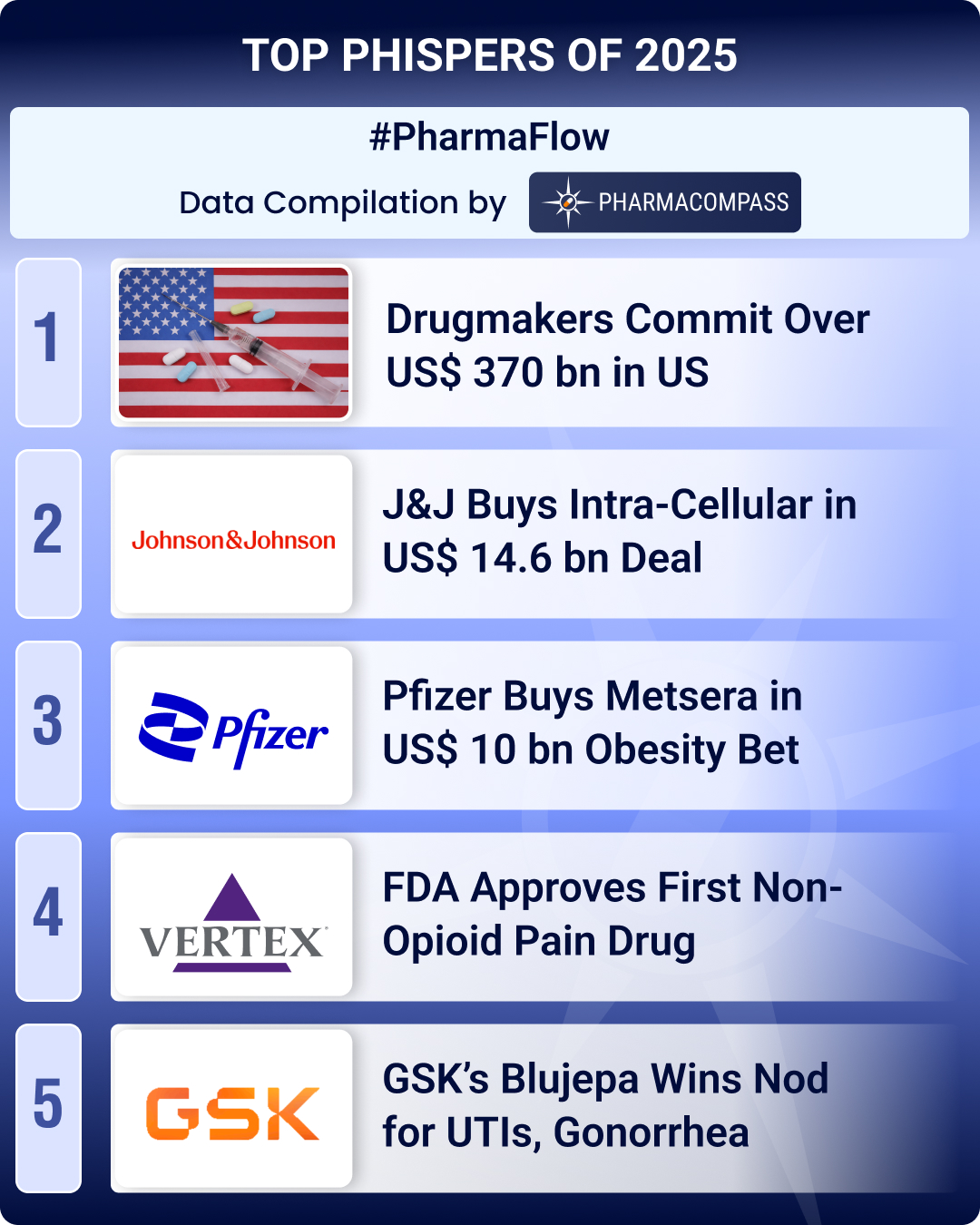BLOG
MARKET INTEL by PharmaCompass
CONTENT by Suppliers
- Interview #SpeakPharma
- Video #SupplierSpotlight
- Vlog #PharmaReel
- Company Bio #AboutSupplier
- Service Bio #AboutCapabilities
News
Create content with us, ask us

01 Clinical Biostatistics and Programming
02 Clinical Biostatistics and Programming
03 Clinical Trial Monitoring
04 Data Management
05 Data Management
06 Overview

01 Astellas Pharma
02 Azidus Laboratories
03 Celerion
04 Chiltern International Ltd
05 Cliantha Research
06 ClinPlus
07 Clinica Research Solutions
08 DZS Clinical Services
09 ERT
10 Elligo Health Research
11 Factory CRO
12 ICBio Clinical Research Pvt Ltd
13 Icon Plc
14 KAI Research
15 LabConnect
16 Litera Microsystems
17 Lovelace Scientific Resources
18 MPI Research Inc
19 Merck Millipore
20 Navatio Pharma
21 Navitas Inc
22 Nutrasource
23 OTTR Chronic Care Solutions
24 PAREXEL International Corporation
25 PPD
26 Prorelix Research
27 Quorum Review, Inc.
28 Quotient Sciences
29 Reliance Clinical Testing Services, Inc
30 Spaulding Clinical, LLC
31 Synexus Limited
32 TFS International AB
33 TransPerfect
34 Trial By Fire Solutions, LLC

01 Canada
02 India
03 Ireland
04 Japan
05 Sweden
06 U.S.A
07 United Kingdom
08 United Kingdom
- Analytical > Analytical Method Development
- Analytical > Analytical Testing Services > Inhalation Products
- Analytical > BioAnalytical Services
- API & Drug Product Development > API Development
- API & Drug Product Development > API Development > Antibody Drug Conjugate
- API & Drug Product Development > API Development > Fine Chemical / Intermediate
- API & Drug Product Development > API Development > High Potency APIs (HPAPIs)
- API & Drug Product Development > API Development > Impurity / Reference Standard
- API & Drug Product Development > API Development > Oligonucleotide / Polynucleotide
- API & Drug Product Development > API Development > Oligosaccharides & Polysaccharides
- API & Drug Product Development > API Development > Overview
- API & Drug Product Development > API Development > Process Development & Optimization
- API & Drug Product Development > API Development > Protein / Peptide
- API & Drug Product Development > API Development > Separation & Purification
- API & Drug Product Development > API Development > Small Molecules
- API & Drug Product Development > API Development > Spray Drying
- API & Drug Product Development > Formulation Development
- API & Drug Product Development > Formulation Development > Buccal / Orodispersible
- API & Drug Product Development > Formulation Development > Capsule
- API & Drug Product Development > Formulation Development > Chewable / Suckable
- API & Drug Product Development > Formulation Development > Clinical Supply
- API & Drug Product Development > Formulation Development > Compounding
- API & Drug Product Development > Formulation Development > Controlled / Immediate / Modified Release
- API & Drug Product Development > Formulation Development > Controlled Substance
- API & Drug Product Development > Formulation Development > Granule / Pellets
- API & Drug Product Development > Formulation Development > Inhalation / Nasal
- API & Drug Product Development > Formulation Development > Injectable / Parenteral
- API & Drug Product Development > Formulation Development > Liquid Formulation
- API & Drug Product Development > Formulation Development > Lyophilization
- API & Drug Product Development > Formulation Development > Ophthalmic
- API & Drug Product Development > Formulation Development > Pediatric Formulation
- API & Drug Product Development > Formulation Development > Scale-Up Capabilities
- API & Drug Product Development > Formulation Development > Sterile Liquid Formulation
- API & Drug Product Development > Formulation Development > Suspension
- API & Drug Product Development > Formulation Development > Tablet
- API & Drug Product Development > Formulation Development > Topical
- API & Drug Product Development > Preformulation & Material Science > Particle Size Reduction & Micronization
- API & Drug Product Development > Preformulation & Material Science > Polymorph & Crystal Screening
- API & Drug Product Development > Preformulation & Material Science > Solubility Assessment & Enhancement
- API & Drug Product Development > Preformulation & Material Science > Taste Masking
- API Manufacturing > Antibiotic
- API Manufacturing > Antibody Drug Conjugate
- API Manufacturing > Biologics, Bioprocess & Fermentation
- API Manufacturing > Chiral Synthesis
- API Manufacturing > Clinical Supply
- API Manufacturing > Continuous Flow Process
- API Manufacturing > Contract Manufacturing
- API Manufacturing > Controlled Substance
- API Manufacturing > Custom Synthesis & Manufacturing
- API Manufacturing > Cytotoxic Compound
- API Manufacturing > Drying > Spray Drying
- API Manufacturing > Fine Chemical / Intermediate
- API Manufacturing > GMP Manufacturing
- API Manufacturing > Hazardous Chemistry
- API Manufacturing > High Potency APIs (HPAPIs)
- API Manufacturing > Micronization
- API Manufacturing > Oligonucleotide / Polynucleotide
- API Manufacturing > Oligosaccharides & Polysaccharides
- API Manufacturing > Organometallic Chemistry
- API Manufacturing > Organometallic Chemistry > Cyanation
- API Manufacturing > Organometallic Chemistry > Metal Hydride Reduction
- API Manufacturing > Ozonolysis
- API Manufacturing > Process Development & Optimization
- API Manufacturing > Protein / Peptide > Synthesis
- API Manufacturing > Reference Standard
- API Manufacturing > Scale Up
- API Manufacturing > Separation & Purification
- API Manufacturing > Small Molecules
- Clinical Trials > Compliance, Regulatory & Consulting
- Clinical Trials > Packaging & Logistics
- Clinical Trials > Medical Writing & Language Translation
- Clinical Trials > Patient / Investigator Recruitment
- Clinical Trials > Technology / Data / Analytics
- Drug Product Manufacturing > Biologic Drugs
- Drug Product Manufacturing > Capsule
- Drug Product Manufacturing > Capsule > Steroid / Hormone
- Drug Product Manufacturing > Compounding
- Drug Product Manufacturing > Cream / Lotion / Ointment
- Drug Product Manufacturing > Emulsion > Overview
- Drug Product Manufacturing > Gel > Overview
- Drug Product Manufacturing > Granule / Pellet
- Drug Product Manufacturing > Injectable / Parenteral
- Drug Product Manufacturing > Injectable / Parenteral > Overview
- Drug Product Manufacturing > Injectable / Parenteral > Pre-Filled Syringe
- Drug Product Manufacturing > Liquid
- Drug Product Manufacturing > Lyophilization
- Drug Product Manufacturing > Nasal
- Drug Product Manufacturing > Softgel Capsule
- Drug Product Manufacturing > Solution > Overview
- Drug Product Manufacturing > Spray
- Drug Product Manufacturing > Suppository
- Drug Product Manufacturing > Suspension > Overview
- Drug Product Manufacturing > Syrup
- Drug Product Manufacturing > Tablet
- Drug Product Manufacturing > Technologies
- Drug Product Manufacturing > Technologies > Orally Disintegrating Tablets (ODTs)
- Drug Product Manufacturing > Technologies > Taste Masking
- Packaging > Clinical Services
- Packaging > Contract Services
- Packaging > Contract Services > Serialization Compliance
- Packaging > Logistic Services
- Empty Capsules
- Empty Capsules > Clinical Supply
- Empty Capsules > HardGel
- Empty Capsules > Inhalation
- Emulsifying Agents
- Soft Gelatin
- Solubilizers
Looking for Clinical data management services? Find CROs offering clinical data analytics, data monitoring & clinical management on PharmaCompass.
Q1. What is clinical data management? What are the key factors to consider when selecting a clinical data management system (CDMS)?
Clinical data management (CDM) is the process that involves the collection, organization, management, and validation of research data to ensure it meets regulatory standards. The primary goal of the clinical data management process is to ensure the provision of high-quality datasets by minimizing errors and missing data, thus maximizing the data available for analysis. This begins with establishing data collection tools and storing data, implementing validation steps for accurate clinical trial data, and ensuring compliance with ICH-GCP and relevant regulations.
Moreover, certifying the quality of clinical trial data is crucial for safeguarding patient safety and verifying effectiveness in clinical development. Effective clinical trial data management can extract high-quality, reliable, and statistically comprehensive data, potentially reducing study duration and drug development costs.
Various services involved in clinical trial data management include case report form (CRF) design, database design, development, and maintenance, data entry, medical coding, electronic data integration, and data management plan development. Additionally, CDM services also comprise statistical analysis software (SAS) listing development, electronic data capture (EDC) selection, end-user training, eSource and ePRO/eCOA, SDTM programming, external data import and reconciliation, etc.
For efficient collection and management of clinical trial data certain tools are required. Selecting the right clinical trial data management system is essential for ensuring the success of clinical studies. Clinical data management system (CDMS) is one such software tool that is used to collect, manage, validate, and share data in clinical investigations. Using a clinical data management system improves data quality, streamlines management processes, prepares data for analysis, and ensures regulatory compliance in clinical trials. Various clinical data management systems (CDMS) are available for clinical trials, ranging from open-source tools to customizable commercial software solutions.
Some of the the key factors to consider when selecting a CDMS include:
Data Protection and Confidentiality: Data management for clinical trial systems should have robust encryption protocols to protect sensitive clinical trial data. Ensure the system has reliable data backup and disaster recovery mechanisms.
Functionality and Attributes: Efficient EDC enables accurate clinical trial data collection, with user-friendly CRF design tools and effective query management to resolve data discrepancies.
Regulatory Adherence: Ensure the CDMS complies with international and local regulations such as FDA 21 CFR Part 11, EMA, ICH-GCP, HIPAA, and GDPR for acceptance of clinical trial data by regulatory authorities.
Data Management and Analytics: Clinical data management tools for advanced data analytics, including predictive analytics and machine learning. Effective data visualization tools to help stakeholders understand and interpret data easily.
Reduced Cost: Consider both the initial investment required for purchasing and implementing the system, as well as ongoing operational costs such as maintenance, updates, and support for data management in clinical trials.
Therefore, clinical data management is a vital component of clinical trials that underpins the reliability and credibility of the trial results. Effective CDM practices ensure that clinical trial data is collected, handled, and reported in a manner that supports regulatory compliance, enhances data integrity, and ultimately contributes to the advancement of medical research and patient care. These solutions are provided by certain clinical research organizations that offer clinical data management CRO services and clinical trial services for data management in clinical research.
Q2. What are the most effective statistical methods for analyzing clinical trial data to ensure robust results?
Data analysis is the cornerstone of evidence-based practice in clinical research, propelling the development of new treatments and interventions. Effective statistical methods are essential for analyzing clinical trial data to ensure robust and valid results. By utilizing statistical techniques and advanced analytical tools, researchers can derive insights from extensive data sets that directly influence clinical trials.
Effective biostatistics is crucial in modern clinical research, offering the quantitative tools and statistical methods needed to collect, analyze, and interpret data from clinical trials and health studies. Various clinical research organizations possess extensive experience in clinical data services, enabling them to grasp the intricacies of data management in clinical research, biostatistics and programming, data standardization, medical writing, and submissions.
One of the most common statistical approaches is descriptive analysis that uses indices such as mean, median, mode, standard deviation, variance that provides a central tendency of the data. Moreover, inferential statistics approach utilizes t-tests, Chi-Square test, ANOVA, and P-values that compares and assess data among groups and determine the significance of results.
Another approach in clinical trial data analytics is regression analysis that comprises linear and logistic regression for examining the relationship between dependent or independent variables. Additionally, biostatisticians use survival analysis to estimate and compare the survival function from lifetime data. Bayesian inference incorporates prior knowledge along with the data to estimate the probability of hypotheses. Whereas, Bayesian hierarchical models are useful for complex data structures and incorporating multiple levels of variation.
Furthermore, interim analysis is conducted at predefined points during the trial to evaluate efficacy or safety of clinical trial data and make decisions about the continuation of the clinical trial. Adaptive trial designs allow for adjustments to sample size based on interim results. Lastly, cluster analysis groups observations into clusters that maximize similarity within clusters and differences between clusters.
By employing these statistical methods, researchers can ensure the robustness and reliability of clinical trial results. Each method addresses different aspects of the clinical trial data, from handling missing data and controlling for confounding variables to adapting the trial design based on interim findings. This comprehensive approach helps in deriving meaningful conclusions while maintaining the integrity of the study.
Q3. What is clinical trial technology and how do these technologies facilitate the management of multi-site and global trials?
Clinical trial technology refers to new techniques and tools that can help make clinical trials more patient-focused. These technologies lead innovation, boosting efficiency and improving clinical research accuracy in the fast-changing healthcare and pharmaceutical sectors. Clinical trial technologies play a crucial role in facilitating the management of multi-site and global trials by addressing the complexities and challenges inherent in such trials. Here are several ways in which clinical data management technologies enhance the efficiency of multi-site and global clinical trials:
1. Centralized Data Management: Clinical data management systems such as EDC enable centralized collection, storage, and management of clinical trial data from multiple sites, ensuring consistency and accessibility.
2. Enhanced Communication and Collaboration: Clinical Trial Management Systems (CTMS) facilitate communication and coordination among different sites by providing tools for project and site management and document sharing. Clinical data management technologies such as secure messaging, video conferencing, and shared digital workspaces enhance real-time collaboration between global teams.
3. Real-Time Monitoring and Reporting: Remote monitoring technologies allow for real-time oversight of clinical trial activities, enabling centralized monitoring teams to review data and identify issues promptly. Moreover, clinical data management technologies and data analytics platforms provide real-time insights into trial progress, performance metrics, and site compliance, facilitating timely decision-making.
4. Standardization of Processes: Clinical trial technology platforms ensure that standard operating procedures (SOPs) are consistently applied across all sites, maintaining uniformity in trial conduct.
5. Regulatory Compliance: Clinical data management technologies streamline the preparation and submission of regulatory documents, ensuring compliance with local and international regulations.
6. Patient Recruitment and Retention: Digital recruitment platforms use data analytics and digital marketing to identify and recruit eligible patients from diverse geographic locations.
7. Supply Chain Management: Automated supply tracking technologies such as RFID and IoT devices track the movement and status of clinical trial supplies in real-time, ensuring timely delivery and reducing wastage.
8. Adaptive Trial Designs: Adaptive trial technologies allow for modifications to the clinical trial design based on interim data, which is crucial for managing diverse patient populations and responses across sites.
9. Quality Management Systems (QMS): Integrated QMS ensures consistent quality control across all trial sites, maintaining high standards of data integrity and patient safety.
By leveraging these technologies, sponsors and CROs can efficiently manage the complexities of multi-site and global clinical trials. These tools enhance coordination, ensure regulatory compliance, improve data quality, and facilitate effective communication and monitoring, ultimately leading to more successful and streamlined clinical trial operations. Certain clinical research organizations provide clinical data management CRO services and clinical trial services and utilize clinical trial technologies and clinical data management technologies for facilitating effective trial results.
Q4. What role does clinical data monitoring play in the management of clinical trial data?
Clinical data monitoring is a crucial component of managing clinical trial data, ensuring that the trial is conducted according to the protocol, regulatory requirements, and ethical standards. It requires continuous monitoring and evaluation of study data to detect any possible issues, deviations, or concerns that could affect the accuracy and dependability of trial outcomes. The monitoring capabilities encompass scheduling, adverse event tracking, and automated notifications to sponsors, among other functionalities. Some of the key roles data monitoring plays in clinical trial data management is explained below:
1. Ensuring Data Integrity and Accuracy: Source Data Verification (SDV) verifies that the data entered into the CRFs matches the source documents, ensuring accuracy, consistency, and reliability.
2. Maintaining Protocol Compliance: Clinical data monitoring ensures that the trial is conducted according to the approved protocol, and identifies, document, and address deviations if any.
3. Enhancing Data Quality: Clinical data monitoring helps in identifying and resolving data issues such as missing, inconsistent, or out-of-range values through queries and direct communication with site personnel.
4. Ensuring Participant Safety: Clinical trial data monitoring ensures adverse events (AEs) and serious adverse events (SAEs) are accurately documented and reported in a timely manner, as per regulatory requirements. Continuous monitoring helps identify any safety concerns early, ensuring prompt action to protect participant well-being.
5. Facilitating Regulatory Compliance: Clinical data monitors ensure that the trial complies with local and international regulations such as GCP, FDA, and EMA guidelines. Effective monitoring helps maintain comprehensive and accurate records, ensuring the trial is audit-ready and can withstand regulatory inspections.
6. Improving Site Performance: Clinical trial monitoring provides ongoing training and support to site staff, ensuring they understand and correctly implement the protocol and data collection procedures.Regular feedback on performance helps sites improve their data collection and clinical data management processes, enhancing overall trial efficiency.
7. Risk-Based Monitoring (RBM): Clinical trial monitors conduct risk assessments to identify high-risk data points and processes that require more intensive monitoring for data management in clinical trials.
8. Documenting Trial Progress: Clinical trial Monitors create detailed reports documenting each monitoring visit, and providing a clear record of the trial’s progress and issues encountered for efficient clinical data management.
9. Data Management Support: Monitors assist clinical data management teams by facilitating the resolution of data queries, ensuring timely and accurate responses from site staff.
10. Enhancing Trial Efficiency: Real-time monitoring allows for rapid identification and resolution of issues, thereby improving the overall efficiency of clinical trial studies, thus streamlining processes in clinical trials data management.
Clinical data monitoring is an integral part of clinical data services for the management of clinical trial data. It plays a vital role in ensuring data integrity, participant safety, protocol compliance, and regulatory adherence. By providing ongoing oversight and support, monitors help maintain high data quality and trial efficiency, ultimately contributing to the reliability and success of clinical research.
Q5. What are various clinical research organizations or pharma companies offering clinical trial data management services?
Clinical trial data is extensive and must be properly collected, streamlined, analyzed, and presented in formats that comply with regulatory standards. Recently, various clinical research organizations (CROs) and pharma companies, can provide clinical data management services or CDM services. These are also known as clinical data management CRO that might also offer data management services and clinical data services.
These clinical trial data management service providers offer end-to-end clinical data management solutions including, expert medical coding, rapid database launch, integration of clinical data sources, query management, and quality clinical trial data. The market for outsourcing clinical data management services and data services for clinical trials is constantly expanding.
Several clinical data management CROs and clinical trial data management service providers have clinical data management technologies and might offer comparable clinical trial services such as data management in clinical research, CDM, data management for clinical trials, etc. These clinical data management CROs might have years of experience in data management in clinical trials. Some of the top clinical data management service providers and clinical research organizations offering clinical trial data management services are explained below:
Quotient Sciences: Quotient Sciences offers clinical data management services and performs data management and database programming, such as study database set-up and maintenance. Through its clinical data management technologies it provides CDM services including clinical data management plan, data cleaning, coding, query issue, and database lock.
Renejix: Renejix leverages statistical inputs, methods, and models to facilitate decision making in biological experiments. Its full suite of biostatistics and data services for clinical trials include study design, randomization, statistical analysis plan, programming and data analysis, etc.
LabConnect: LabConnect offers biovisualization clinical data management services including data management for clinical trials and analysis. Its clinical trial data management streamlines the handling of client's clinical trial data, resulting in accurate, actionable, and timely evidence.
Litera Microsystems: Literas' AxxiTRIALS, provides clinical research organizations (CROs), with a fully automated, clinical trials portal. Its portal allows clinical data management and clinical data analytics for document exchange between clinical trial sites and sponsors.
Celerion: Celerion is a clinical research organization offering clinical biostatistics and data services for clinical trials. Its clinical data management CRO services include study design, CRF design, data import and export and clinical trial data management services.
All Suppliers
01
Pharma Service : Clinical Trials
Category : Technology / Data / Analytics
Sub Category : Data Management
Pharma Service : Clinical Trials
02
Pharma Service : Clinical Trials
CLINICAL STATISTICS & STATISTICAL PROGRA...
Category : Technology / Data / Analytics
Sub Category : Clinical Biostatistics and Programming
Pharma Service : Clinical Trials
03
Pharma Service : Clinical Trials
Category : Technology / Data / Analytics
Sub Category : Clinical Trial Monitoring
Pharma Service : Clinical Trials
04
Pharma Service : Clinical Trials
Category : Technology / Data / Analytics
Sub Category : Data Management
Pharma Service : Clinical Trials
05
Pharma Service : Clinical Trials
CLINICAL TRIAL DATA MANAGEMENT
Category : Technology / Data / Analytics
Sub Category : Clinical Trial Monitoring
Pharma Service : Clinical Trials
06
Pharma Service : Clinical Trials
CLINICAL DATA MANAGEMENT (CDM)
Category : Technology / Data / Analytics
Sub Category : Data Management
Pharma Service : Clinical Trials
07
Pharma Service : Clinical Trials
CLINICAL TRIAL MANAGEMENT SYSTEM (CTMS)
Category : Technology / Data / Analytics
Sub Category : Data Management
Pharma Service : Clinical Trials
08
Pharma Service : Clinical Trials
CLINICAL TRIAL DATA MANAGEMENT
Category : Technology / Data / Analytics
Sub Category : Clinical Trial Monitoring
Pharma Service : Clinical Trials
09
Pharma Service : Clinical Trials
CLINICAL DATA MANAGEMENT SERVICES
Category : Technology / Data / Analytics
Sub Category : Clinical Biostatistics and Programming
Pharma Service : Clinical Trials
10
Pharma Service : Clinical Trials
CLINICAL TRIAL DATA MANAGEMENT SERVICES
Category : Technology / Data / Analytics
Sub Category : Data Management
Pharma Service : Clinical Trials
11
Pharma Service : Clinical Trials
DATA MANAGEMENT FOR CLINICAL TRIALS
Category : Technology / Data / Analytics
Sub Category : Data Management
Pharma Service : Clinical Trials
12
Pharma Service : Clinical Trials
CLINICAL DATA MANAGEMENT (CDM)
Category : Technology / Data / Analytics
Sub Category : Clinical Biostatistics and Programming
Pharma Service : Clinical Trials
13
Pharma Service : Clinical Trials
DATA MANAGEMENT FOR CLINICAL TRIALS
Category : Technology / Data / Analytics
Sub Category : Data Management
Pharma Service : Clinical Trials
14
Pharma Service : Clinical Trials
CLINICAL TRIAL DATA MANAGEMENT
Category : Technology / Data / Analytics
Sub Category : Data Management
Pharma Service : Clinical Trials
15
Pharma Service : Clinical Trials
CLINICAL DATA MANAGEMENT & MONITORING
Category : Technology / Data / Analytics
Sub Category : Clinical Trial Monitoring
Pharma Service : Clinical Trials
16
Pharma Service : Clinical Trials
DATA MANAGEMENT FOR CLINICAL TRIALS
Category : Technology / Data / Analytics
Sub Category : Clinical Trial Monitoring
Pharma Service : Clinical Trials
17
Pharma Service : Clinical Trials
CLINICAL TRIAL DATA MANAGEMENT
Category : Technology / Data / Analytics
Sub Category : Data Management
Pharma Service : Clinical Trials
18
Pharma Service : Clinical Trials
CLINICAL DATA MANAGEMENT (CDM)
Category : Technology / Data / Analytics
Sub Category : Clinical Trial Monitoring
Pharma Service : Clinical Trials
19
Pharma Service : Clinical Trials
CLINICAL DATA MANAGEMENT (CDM)
Category : Technology / Data / Analytics
Sub Category : Clinical Trial Monitoring
Pharma Service : Clinical Trials
20
Pharma Service : Clinical Trials
CLINICAL MONITORING & DATA MANAGEMENT
Category : Technology / Data / Analytics
Sub Category : Clinical Trial Monitoring
Pharma Service : Clinical Trials
21
Pharma Service : Clinical Trials
CLINICAL DATA MANAGEMENT & BIOMETRICS
Category : Technology / Data / Analytics
Sub Category : Data Management
Pharma Service : Clinical Trials
22
Pharma Service : Clinical Trials
CLINICAL DATA MANAGEMENT SERVICES
Category : Technology / Data / Analytics
Sub Category : Data Management
Pharma Service : Clinical Trials
23
Pharma Service : Clinical Trials
CLINICAL DATA MANAGEMENT SERVICES
Category : Technology / Data / Analytics
Sub Category : Data Management
Pharma Service : Clinical Trials
24
Pharma Service : Clinical Trials
Category : Technology / Data / Analytics
Sub Category : Data Management
Pharma Service : Clinical Trials
25
Pharma Service : Clinical Trials
BIOSTATISTICAL & DATA MANAGEMENT SERVICE...
Category : Technology / Data / Analytics
Sub Category : Clinical Biostatistics and Programming
Pharma Service : Clinical Trials
26
Pharma Service : Clinical Trials
CLINICAL DATA MANAGEMENT (CDM)
Category : Technology / Data / Analytics
Sub Category : Clinical Trial Monitoring
Pharma Service : Clinical Trials
27
Pharma Service : Clinical Trials
CLINICAL MONITORING & DATA MANAGEMENT
Category : Technology / Data / Analytics
Sub Category : Clinical Trial Monitoring
Pharma Service : Clinical Trials
28
Pharma Service : Clinical Trials
CLINICAL STATISTICS & DATA MANAGEMENT
Category : Technology / Data / Analytics
Sub Category : Clinical Biostatistics and Programming
Pharma Service : Clinical Trials
29
Pharma Service : Clinical Trials
CLINICAL DATA MANAGEMENT PLANS
Category : Technology / Data / Analytics
Sub Category : Data Management
Pharma Service : Clinical Trials
30
Pharma Service : Clinical Trials
CLINICAL TRIAL DATA MANAGEMENT SERVICES
Category : Technology / Data / Analytics
Sub Category : Data Management
Pharma Service : Clinical Trials
31
Pharma Service : Clinical Trials
CLINICAL DATA MANAGEMENT SERVICES
Category : Technology / Data / Analytics
Sub Category : Overview
Pharma Service : Clinical Trials
32
Pharma Service : Clinical Trials
Category : Technology / Data / Analytics
Sub Category : Clinical Trial Monitoring
Pharma Service : Clinical Trials
33
Pharma Service : Clinical Trials
CLINICAL DATA MANAGEMENT & ANALYTICS
Category : Technology / Data / Analytics
Sub Category : Data Management
Pharma Service : Clinical Trials
34
Pharma Service : Clinical Trials
Category : Technology / Data / Analytics
Sub Category : Clinical Trial Monitoring
Pharma Service : Clinical Trials
35
Pharma Service : Clinical Trials
DATA MANAGEMENT FOR CLINICAL TRIALS
Category : Technology / Data / Analytics
Sub Category : Data Management
Pharma Service : Clinical Trials
36
Pharma Service : Clinical Trials
CLINICAL DATA MANAGEMENT (CDM)
Category : Technology / Data / Analytics
Sub Category : Clinical Biostatistics and Programming
Pharma Service : Clinical Trials
37
Pharma Service : Clinical Trials
Category : Technology / Data / Analytics
Sub Category : Data Management
Pharma Service : Clinical Trials
38
Pharma Service : Clinical Trials
Category : Technology / Data / Analytics
Sub Category : Data Management
Pharma Service : Clinical Trials
39
Pharma Service : Clinical Trials
CLINICAL DATA MANAGEMENT SERVICES
Category : Technology / Data / Analytics
Sub Category : Clinical Trial Monitoring
Pharma Service : Clinical Trials
40
Pharma Service : Clinical Trials
Category : Technology / Data / Analytics
Sub Category : Data Management
Pharma Service : Clinical Trials
41
Pharma Service : Clinical Trials
CLINICAL BIOSTATISTICS SERVICES
Category : Technology / Data / Analytics
Sub Category : Clinical Biostatistics and Programming
Pharma Service : Clinical Trials
42
Pharma Service : Clinical Trials
CLINICAL TRIAL DATA MANAGEMENT CRO
Category : Technology / Data / Analytics
Sub Category : Data Management
Pharma Service : Clinical Trials
43
Pharma Service : Clinical Trials
CLINICAL TRIAL DATA MANAGEMENT SERVICES
Category : Technology / Data / Analytics
Sub Category : Clinical Trial Monitoring
Pharma Service : Clinical Trials
44
Pharma Service : Clinical Trials
Category : Technology / Data / Analytics
Sub Category : Data Management
Pharma Service : Clinical Trials
45
Pharma Service : Clinical Trials
CLINICAL BIOSTATISTICS & CDM SERVICES
Category : Technology / Data / Analytics
Sub Category : Clinical Biostatistics and Programming
Pharma Service : Clinical Trials
46
Pharma Service : Clinical Trials
Category : Technology / Data / Analytics
Sub Category : Data Management
Pharma Service : Clinical Trials
47
Pharma Service : Clinical Trials
CLINICAL TRIAL DATA MANAGEMENT
Category : Technology / Data / Analytics
Sub Category : Data Management
Pharma Service : Clinical Trials
48
Pharma Service : Clinical Trials
BIOSTATISTICS & STATISTICAL PROGRAMMING
Category : Technology / Data / Analytics
Sub Category : Clinical Biostatistics and Programming
Pharma Service : Clinical Trials
49
Pharma Service : Clinical Trials
Category : Technology / Data / Analytics
Sub Category : Data Management
Pharma Service : Clinical Trials
50
Pharma Service : Clinical Trials
Category : Technology / Data / Analytics
Sub Category : Clinical Biostatistics and Programming
Pharma Service : Clinical Trials
51
Pharma Service : Clinical Trials
CDISC COMPLIANT FORMAT (STUDY DATA TABUL...
Category : Technology / Data / Analytics
Sub Category : Data Management
Pharma Service : Clinical Trials
52
Pharma Service : Clinical Trials
ELECTRONIC REGULATORY & STUDY BINDERS
Category : Technology / Data / Analytics
Sub Category : Data Management
Pharma Service : Clinical Trials
53
Pharma Service : Clinical Trials
Category : Technology / Data / Analytics
Sub Category : Clinical Trial Monitoring
Pharma Service : Clinical Trials
54
Pharma Service : Clinical Trials
ELECTRONIC TRIAL MASTER FILES (ETMF)
Category : Technology / Data / Analytics
Sub Category : Data Management
Pharma Service : Clinical Trials
55
Pharma Service : Clinical Trials
Category : Technology / Data / Analytics
Sub Category : Data Management
Pharma Service : Clinical Trials
56
Pharma Service : Clinical Trials
Category : Technology / Data / Analytics
Sub Category : Data Management
Pharma Service : Clinical Trials
57
Pharma Service : Clinical Trials
Category : Technology / Data / Analytics
Sub Category : Clinical Biostatistics and Programming
Pharma Service : Clinical Trials
58
Pharma Service : Clinical Trials
CLINICAL DATA MANAGEMENT SERVICES
Category : Technology / Data / Analytics
Sub Category : Data Management
Pharma Service : Clinical Trials
59
Pharma Service : Clinical Trials
ELECTRONIC LABORATORY NOTEBOOK SYSTEM
Category : Technology / Data / Analytics
Sub Category : Data Management
Pharma Service : Clinical Trials
60
Pharma Service : Clinical Trials
FULL SERVICE DATA MANAGEMENT SUPPORT
Category : Technology / Data / Analytics
Sub Category : Data Management
Pharma Service : Clinical Trials
61
Pharma Service : Clinical Trials
Category : Technology / Data / Analytics
Sub Category : Clinical Biostatistics and Programming
Pharma Service : Clinical Trials
62
Pharma Service : Clinical Trials
ELECTRONIC CLINICAL OUTCOME ASSESSMENTS ...
Category : Technology / Data / Analytics
Sub Category : Clinical Trial Monitoring
Pharma Service : Clinical Trials
63
Pharma Service : Clinical Trials
Category : Technology / Data / Analytics
Sub Category : Clinical Biostatistics and Programming
Pharma Service : Clinical Trials
64
Pharma Service : Clinical Trials
BIOSTATISTICS & STATISTICAL PROGRAMMING
Category : Technology / Data / Analytics
Sub Category : Clinical Biostatistics and Programming
Pharma Service : Clinical Trials
65
Pharma Service : Clinical Trials
CLINICAL DATA MANAGEMENT, TECHNOLOGIES &...
Category : Technology / Data / Analytics
Sub Category : Data Management
Pharma Service : Clinical Trials
66
Pharma Service : Clinical Trials
Category : Technology / Data / Analytics
Sub Category : Clinical Trial Monitoring
Pharma Service : Clinical Trials
67
Pharma Service : Clinical Trials
STATISTICAL ANALYSIS PLAN DEVELOPMENT
Category : Technology / Data / Analytics
Sub Category : Clinical Biostatistics and Programming
Pharma Service : Clinical Trials
68
Pharma Service : Clinical Trials
DATA MANAGEMENT DOCUMENTATION (DMP, DVP,...
Category : Technology / Data / Analytics
Sub Category : Data Management
Pharma Service : Clinical Trials
69
Pharma Service : Clinical Trials
Category : Technology / Data / Analytics
Sub Category : Clinical Biostatistics and Programming
Pharma Service : Clinical Trials
70
Pharma Service : Clinical Trials
STATISTICAL CONSULTING & TRIAL DESIGNS
Category : Technology / Data / Analytics
Sub Category : Clinical Biostatistics and Programming
Pharma Service : Clinical Trials
71
Pharma Service : Clinical Trials
Category : Technology / Data / Analytics
Sub Category : Data Management
Pharma Service : Clinical Trials
72
Pharma Service : Clinical Trials
SUMMARY TABLES, LISTINGS & FIGURES & LIS...
Category : Technology / Data / Analytics
Sub Category : Clinical Biostatistics and Programming
Pharma Service : Clinical Trials
73
Pharma Service : Clinical Trials
Category : Technology / Data / Analytics
Sub Category : Clinical Biostatistics and Programming
Pharma Service : Clinical Trials
74
Pharma Service : Clinical Trials
INTEGRATED SAFETY SUMMARY (ISS)
Category : Technology / Data / Analytics
Sub Category : Clinical Biostatistics and Programming
Pharma Service : Clinical Trials
75
Pharma Service : Clinical Trials
INTEGRATED SUMMARY OF EFFICACY (ISE)
Category : Technology / Data / Analytics
Sub Category : Clinical Biostatistics and Programming
Pharma Service : Clinical Trials
76
Pharma Service : Clinical Trials
ON-SITE CLINICAL TRIALS FACILITY
Category : Technology / Data / Analytics
Sub Category : Clinical Trial Monitoring
Pharma Service : Clinical Trials
77
Pharma Service : Clinical Trials
Category : Technology / Data / Analytics
Sub Category : Clinical Biostatistics and Programming
Pharma Service : Clinical Trials
78
Pharma Service : Clinical Trials
ADAMS (ANALYSIS DATA MODEL) CDISC COMPLI...
Category : Technology / Data / Analytics
Sub Category : Clinical Biostatistics and Programming
Pharma Service : Clinical Trials
79
Pharma Service : Clinical Trials
CLINICAL DATA MANAGEMENT SERVICES
Category : Technology / Data / Analytics
Sub Category : Data Management
Pharma Service : Clinical Trials
80
Pharma Service : Clinical Trials
81
Pharma Service : Clinical Trials
BIOSTATISTICS FOR CLINICAL TRIALS
Category : Technology / Data / Analytics
Sub Category : Clinical Biostatistics and Programming
Pharma Service : Clinical Trials
82
Pharma Service : Clinical Trials
83
Pharma Service : Clinical Trials
Category : Technology / Data / Analytics
Sub Category : Data Management
Pharma Service : Clinical Trials
84
Pharma Service : Clinical Trials
Category : Technology / Data / Analytics
Sub Category : Clinical Biostatistics and Programming
Pharma Service : Clinical Trials
85
Pharma Service : Clinical Trials
Category : Technology / Data / Analytics
Sub Category : Clinical Trial Monitoring
Pharma Service : Clinical Trials
86
Pharma Service : Clinical Trials
87
Pharma Service : Clinical Trials
Category : Technology / Data / Analytics
Sub Category : Data Management
Pharma Service : Clinical Trials
88
Pharma Service : Clinical Trials
Category : Technology / Data / Analytics
Sub Category : Data Management
Pharma Service : Clinical Trials
89
Pharma Service : Clinical Trials
Category : Technology / Data / Analytics
Sub Category : Data Management
Pharma Service : Clinical Trials
90
Pharma Service : Clinical Trials
Category : Technology / Data / Analytics
Sub Category : Clinical Trial Monitoring
Pharma Service : Clinical Trials
91
Pharma Service : Clinical Trials
Category : Technology / Data / Analytics
Sub Category : Clinical Biostatistics and Programming
Pharma Service : Clinical Trials
92
Pharma Service : Clinical Trials
Category : Technology / Data / Analytics
Sub Category : Clinical Biostatistics and Programming
Pharma Service : Clinical Trials
93
Pharma Service : Clinical Trials
94
Pharma Service : Clinical Trials
Category : Technology / Data / Analytics
Sub Category : Data Management
Pharma Service : Clinical Trials
95
Pharma Service : Clinical Trials
CLINICAL BIOSTATISTICS AND PROGRAMMING
Category : Technology / Data / Analytics
Sub Category : Clinical Biostatistics and Programming
Pharma Service : Clinical Trials
96
Pharma Service : Clinical Trials
CLINICAL BIOSTATISTICS & PROGRAMMING SER...
Category : Technology / Data / Analytics
Sub Category : Clinical Biostatistics and Programming
Pharma Service : Clinical Trials
97
Pharma Service : Clinical Trials
CLINICAL DATA MANAGEMENT & STATISTICS
Category : Technology / Data / Analytics
Sub Category : Data Management
Pharma Service : Clinical Trials















 Quotient Sciences- Molecule to Cure. Fast.
Quotient Sciences- Molecule to Cure. Fast.






